What’s the problem with homemade laundry detergent, you ask? It turns out, there are many.
We all know that laundry products can have a big impact on your wallet.
But it’s crazy to think that how you do your laundry could ALSO have a big impact on your family’s health.
Research is showing that common health problems like allergies and headaches COULD be attributed, in part, to your favorite laundry detergent and other laundry products.
Homemade Detergent -a Good Option?
Don’t be too quick to think that homemade laundry detergent is the answer to all your laundry woes.
I’ve been on a long quest to figure out the best laundry routine for our family’s needs.
And, I’ve learned that there are many hidden problems with homemade detergent. Enough so that, for me, it totally negates any cost savings.
But seriously, who ever knew that when you got married and started raising a few kids, laundry would become such a big part of LIFE?
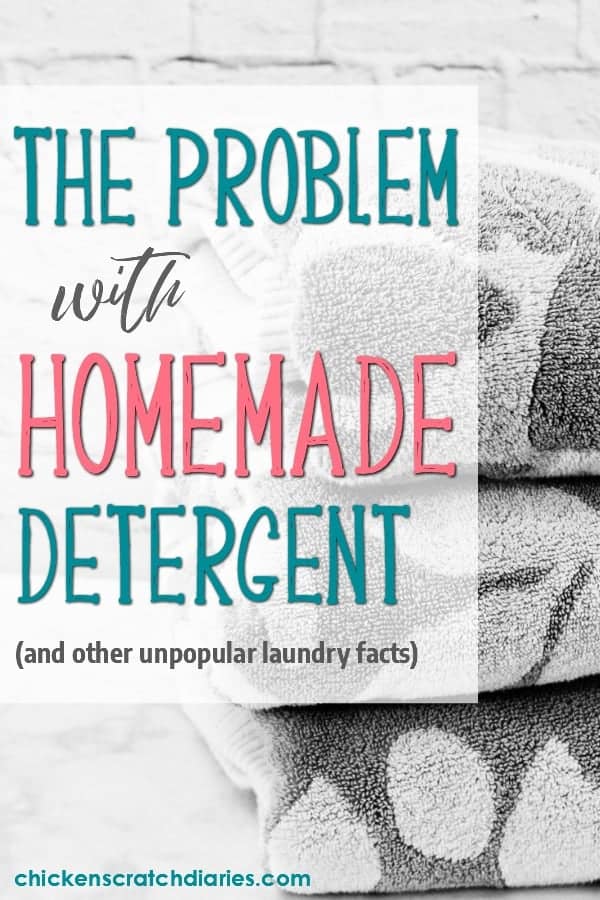
This post likely contains affiliate links. Please see our disclosure for more info.
Read next:
Homemade Foaming Hand Soap Recipe
DIY Face Wash for Sensitive Skin
Falling down the laundry trap
I doubt I ever thought I’d spend time researching laundry detergent, routines and all kinds of science-y stuff, just to figure out better, cheaper, and more efficient ways to wash dirty clothes.
It’s really fascinating! (Said no one, ever. Except nerdy me.)
And then, when I started using cloth diapers four years ago, I fell down a rabbit hole of laundry advice via the internet.
I found out there are lots and lots of varying opinions people hold about laundry and what really “cleans” not only diapers but clothes as well.
Because, of course, the same rules apply to all types of laundry, but you just really, really want to be sure when you’re cleaning stuff as gross as diapers in your washing machine!
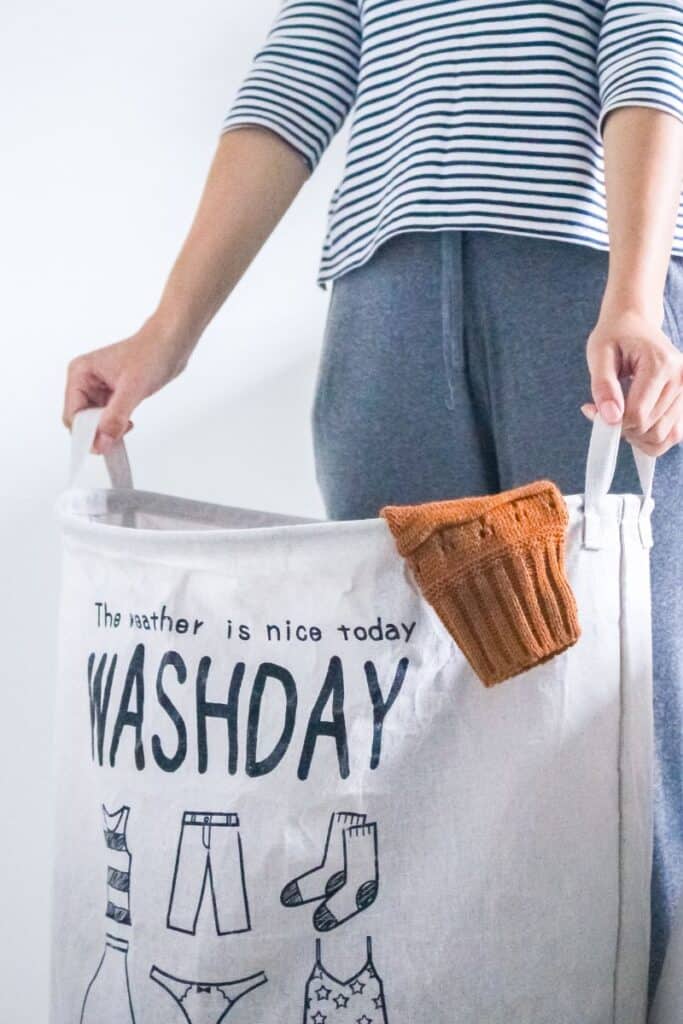
The Science of Laundry
The Dollars and Sense behind Laundry Products
After a lot of reading and trying out different methods, what I’ve discovered is that:
- I had never put much thought much about what was in my detergent (and why it mattered), and
- I never realized the extent to which advertising played into our laundry routines.
Like many other household items we buy, laundry products are a HUGE ($$$) business. We are greatly influenced by marketing – more than we probably know.
But what’s really necessary, worth the money, and what’s not?
And what are some common misconceptions we might have when it comes to what makes laundry “clean”?
The Problem with Homemade Laundry Detergent (plus how to overhaul your laundry routine)
The goal of clean laundry is to not only smell like civilized humans but get rid of the icky stuff that comes into contact with our clothing.
So, the LAST thing we should want is to unknowingly subject ourselves to another set of health risks AFTER the laundry is “clean”.
I think it’s important to be aware of what you’re buying and exposing your family to- and spending your money on.
Whether you’re making your own detergent or buying the store-bought variety — you could be harming your health and/or ruining your washing machine, without even knowing it.
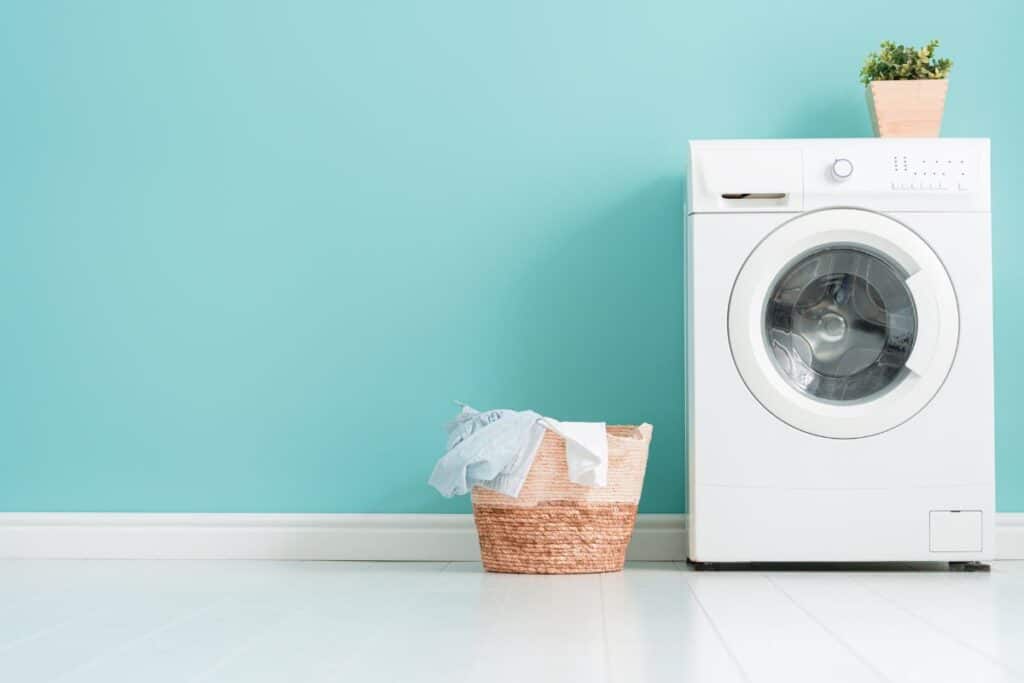
What’s really necessary in laundry products?
And it would STINK to think we’re saving money on DIY methods, only to cost us more money in the long run.
So here’s what you should know, along with some tips to simplify your laundry routine and make healthy changes for your family.
1. Homemade laundry detergents don’t perform the same as commercial detergents.
Some of you are going to hate me for this.
But I did some digging into the question of why homemade laundry soap is bad – and it turns out there are several reasons.
I am actually someone who LOVES searching for natural and DIY alternatives which also save me money.
So, when I say I spent a lot of time trying to figure out the perfect homemade laundry soap recipe- that’s an understatement.
I love the concept, truly. But in my experience, DIY laundry detergent recipes are not that effective (ESPECIALLY in hard water).
About Surfactants
Here’s the main problem with homemade laundry detergent (DIY laundry detergents in general):
They do not contain chemical surfactants (which lift & aid in rinsing away dirt).
I had a reader point out that soap naturally acts as a surfactant – and this is true. But from my research, the surfactants in bar soaps (used in DIY recipes) are not made in the same way.
They are not formulated to be as effective in today’s washing machines.
Chemical surfactants are simply necessary in modern washing machines, if you want laundry that is truly clean. Why?
The agitation isn’t as strong in a washing machine as it was in the old hand-crank or washboard days of yore.
In those days, soap (and dirt) could be scrubbed off just fine, although quite harshly.
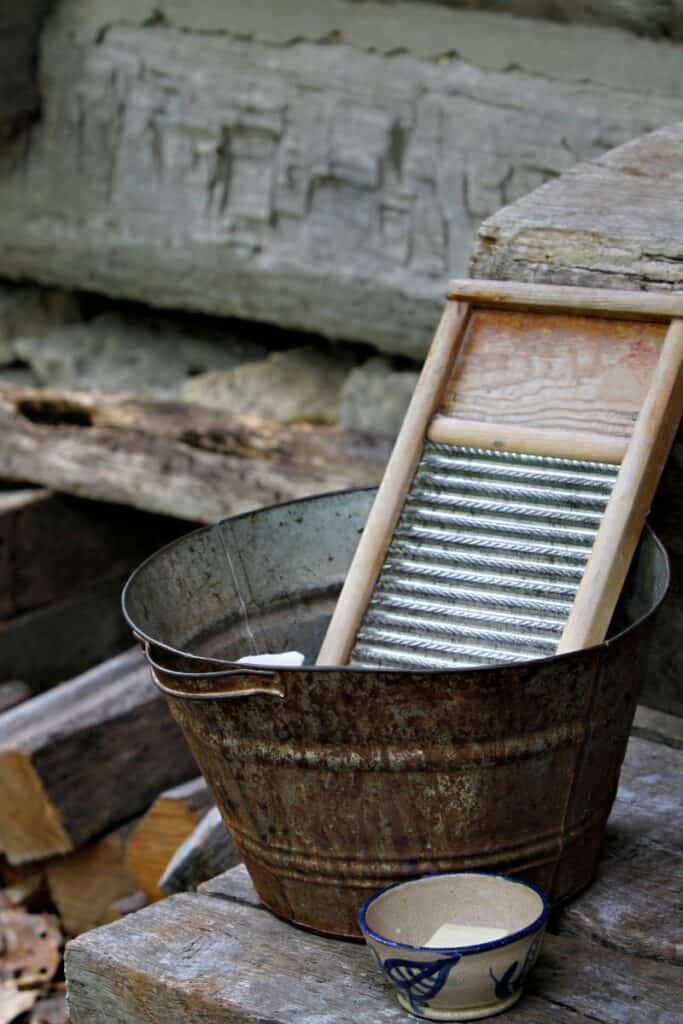
Modern formulas for modern washing machines
So what actually happens is, those slimy soaps cling to your fabrics and build up over time, actually trapping the dirt underneath.
How to test the effectiveness of your laundry soap
If you really want to see how well your laundry soap (DIY or otherwise) is working, here’s another trick I learned.
This is something that cloth diapering moms do frequently. It’s called “stripping” the laundry.
You wash and dry your laundry as usual. Then, put that clean load back into the washer with your normal amount of laundry soap. Let the tub fill and agitate for a few minutes; then let it sit overnight.
Open the lid (for top loading machines) and look at the color of the water. If you have grey or dirty-looking water, your laundry soap is under-performing.
So when using homemade laundry soap, you should try this experiment AFTER a few months and see what the results are.
Other reasons bar soaps are problematic
Modern washing machines simply can’t break down the grated soaps (like Zote or Fels Naptha). These are a common ingredient in DIY laundry soap recipes.
Zote, for example, contains tallow (animal fat) and coconut oil. So although bar soap can lift SOME dirt away- it’s not going to be nearly as effective.
That’s because the fats build up in the fibers and do not rinse off of clothes as well as with store-bought detergents (with chemical surfactants).
And, like fabric softeners, this buildup is not only problematic for your clothes, but also the parts in your washing machine (which you can’t see).
Emily over at Butter Believer wrote a very detailed article explaining the science behind why you should not use the popular recipes for homemade laundry soap. She does a much better job explaining this than I ever could, so check it out if you’re curious!
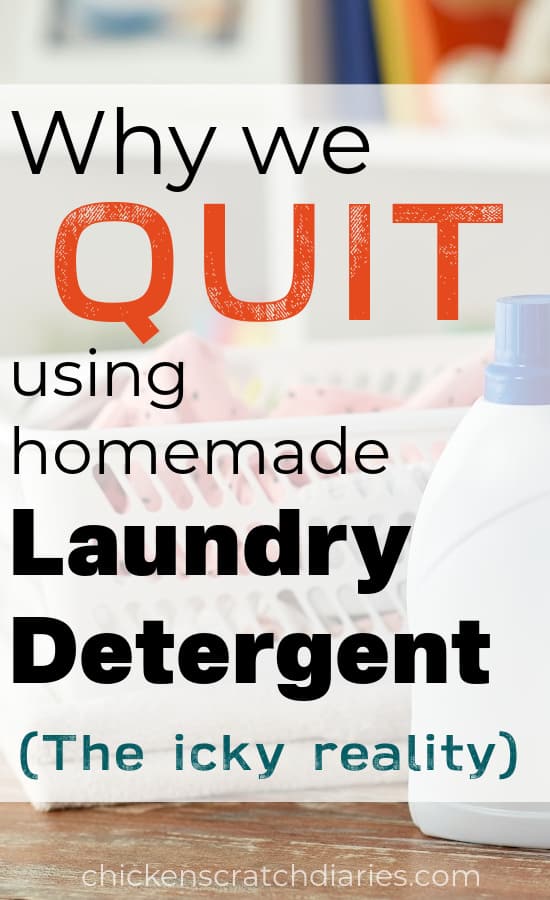
Light bulb moment
This information totally explained why those recipes seem to work at first, but not for long. I do disagree on her stance on vinegar being unsafe for washing machines.
From the many articles and opinions I have read, although vinegar is an acid, it does not seem there is any proof that it damages the rubber gaskets on your washing machine.
(Especially the materials used to make these parts in more recent years). My reasoning:
Even the “cleaning vinegar” only has a 6% concentration of vinegar, and diluted in several gallons of water and rinsed well, it should not be potent enough to cause damage.
In fact, it’s more beneficial in my mind than common (and more costly) alternatives.
Overall, the current consensus seems to be that there is not a significant risk for using vinegar in your machine and that those warnings are based on outdated information.
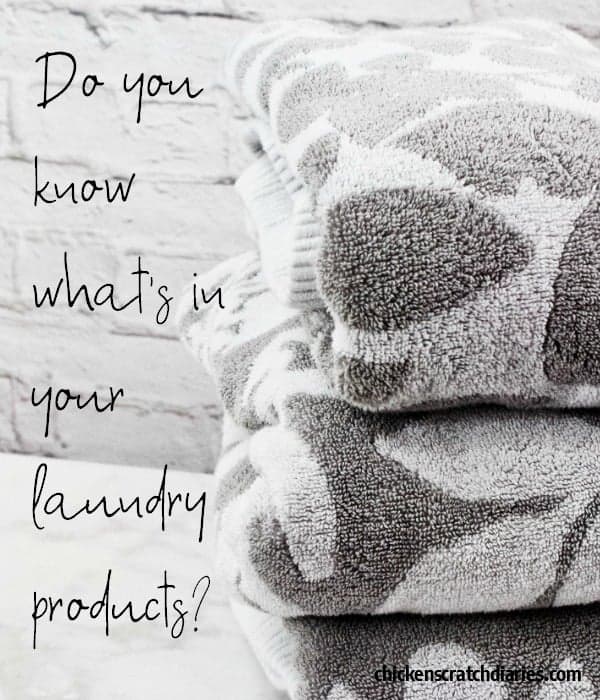
2. Fabric softeners are the (laundry) devil.
Now that we’ve explored the problem with homemade laundry detergent, let’s talk about fabric softener, too.
Whether it’s liquid fabric softener or dryer sheets – they just aren’t good for your clothes, your health or your washer and dryer.
Both types contain synthetic chemicals that are commonly known to cause eczema and allergic reactions.
Even worse:
Some of these chemicals are linked to more serious health problems like cancer and central nervous system disorders, just to name a few (yikes).
Not only do fabric softeners build up in your clothing, your sheets and towels, they are released into the air you breathe.
Liquid fabric softeners also contain animal fats that wreak havoc on your washing machine.
I had a washing machine repair tech explain this to me years ago, and everything I’ve read since then rings true to his advice.
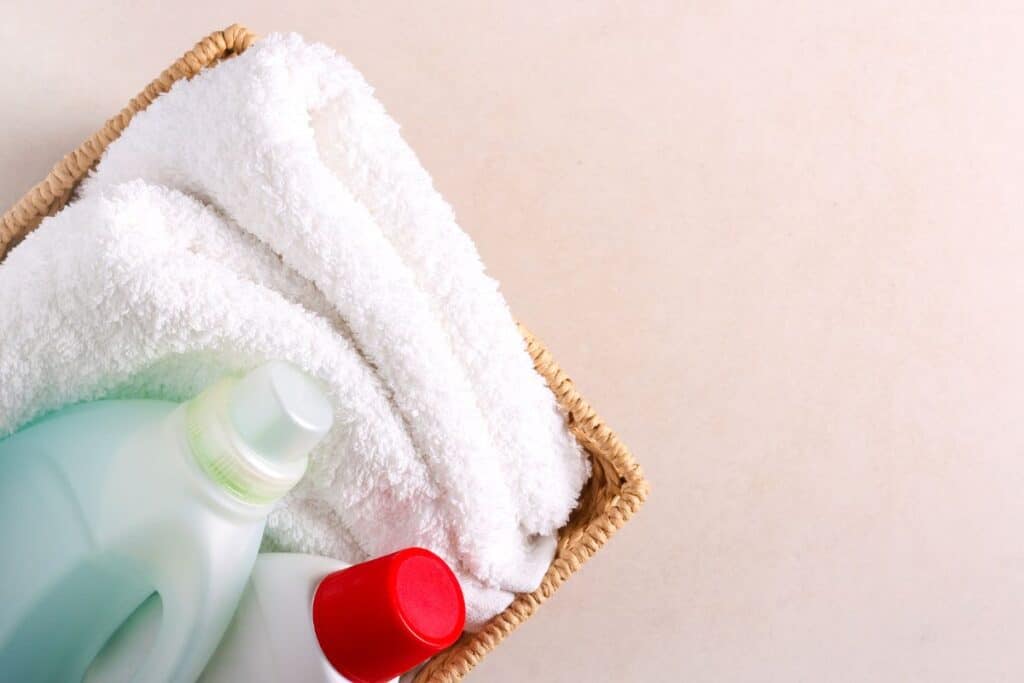
Fabric softeners: more risk than reward
Did you know?
You’re supposed to clean your fabric softener dispenser regularly, but few people do (or even know how).
These fats then build up in your machine and can also grow mold and bacteria inside your dispenser (which happened to me — truly disgusting).
The chemicals that coat dryer sheets also deposit onto your lint trap in your dryer, creating an invisible film and a potential fire hazard.
Again, these traps are supposed to be cleaned & scrubbed frequently with soapy water.
Related Post: A Practical Mom’s Guide to a Naturally Healthier Home This Year
I’ve also had issues with fabric softeners spotting/staining clothing (an issue that went away after I stopped using them).
P.S. – this is another problem with homemade laundry detergent: when the soap doesn’t rinse well, it can cause oily stains.
Do you really need fabric softener?
It was interesting, after trying several different brands over the years, that the difference between using them and not using them was hardly noticeable in terms of fabric softness.
Overall, these products are largely unnecessary, especially considering the cost which can quickly add up!
Fabric softener alternatives
Instead, try adding a 1/4 cup of white vinegar to your fabric softener dispenser in your washing machine. You will not notice the vinegar smell after your clothes are rinsed and dried.
Vinegar helps to remove residue and will naturally make your clothes softer. As a bonus, it’s a natural disinfectant and deodorizer.
Other great alternatives for softening clothes: baking soda (add 1/2 cup to wash load before adding clothes), and wool dryer balls.
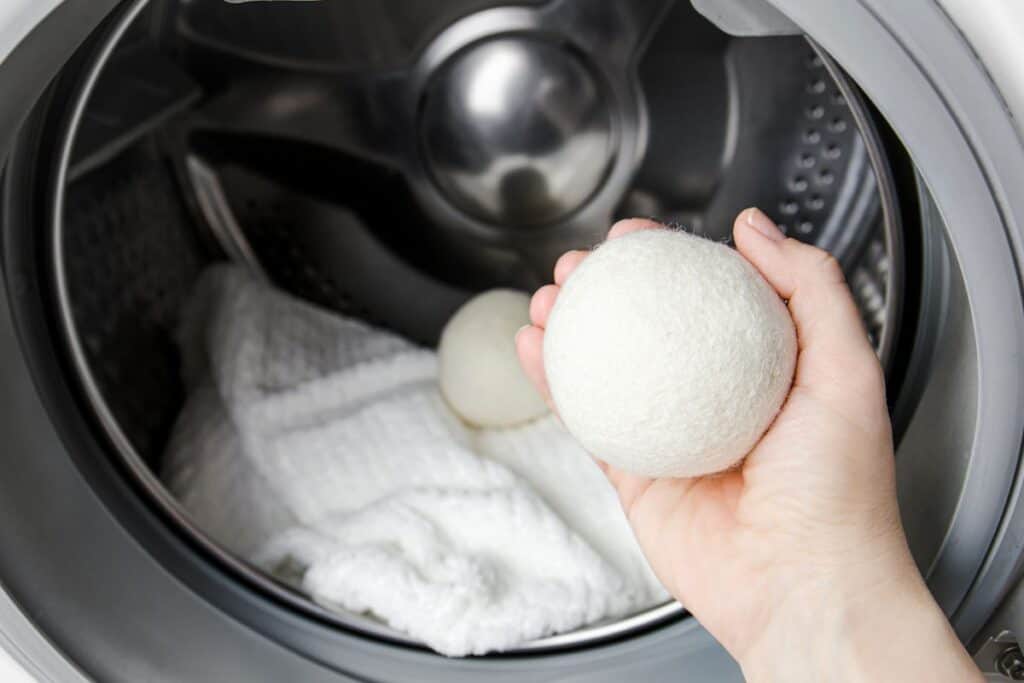
Wool dryer balls: safe and effective
Pro tips:
To keep your dryer balls from tumbling all over your laundry room – keep them in a large or extra-large mesh laundry bag in the dryer.
If you’re still worried about static cling, drying your clothes on the low-heat setting will help tremendously. (Over-drying = more static).
You will have to dry them a little longer, but here’s another great hack: Add a dry towel to every load of laundry and this will reduce your drying time tremendously!
I keep a clean towel on a shelf just for this purpose and it works well.
3. Fragrance does not equal clean.
I totally get that we all want to be transported to a mango-vanilla-sunshine-filled rainforest every time we do the laundry.
I mean, laundry is not fun and every mom needs an escape from that stinky reality, right?
Not to mention, smell is a powerful sense that can trigger wonderful memories of simpler times and fresh-baked pies in Grandma’s kitchen.
Those thoughts just make us feel all comfy-cozy and…clean? That’s definitely what the laundry product manufacturers want us to think.

Laundry in a Lavender field?
However, I can’t tell you how much better I’ve felt since I’ve started eliminating synthetic fragrances from my household.
Over the last few years, the change has been significant. I used to suffer from headaches at least a few times a week and almost constant allergies and sinus infections.
Candles were the first thing to go, then air fresheners, then scented hand lotions and hand soaps.
(My chronic red, chapped hands are a thing of the past by the way – thanks to my foaming hand soap recipe I use now.)
Side note:
The word “fragrance” on a label can be a term hiding over 3,000 synthetic chemicals.
These do not have to be listed individually on cleaning (and other) products sold in the U.S.
(Read more here and here if you’re really, really bored.)
Also read: Natural Homemade Facial Cleanser Recipe
Interestingly enough, a lot of the chemical fragrances that are added to products are only there to mask other smelly chemicals in said products. Confused yet?
Experimenting with Laundry Detergents
Back to my scent investigation: Next, I started to look into the laundry detergent we use.
I already knew that we were “that itchy family” who couldn’t use any of the cheap store brands. We would break out every time I tried one.
A few “clear” winners (pun intended)
After trying several free-and-clear brands, one day I stumbled upon Biokleen Laundry Powder.
It’s been my favorite detergent for some time now. I do have to shop around for the best price, as it fluctuates frequently. (Like everything else these days.)
It’s a plant-based formula, we’ve had zero itchiness, and there’s no added synthetic fragrances to drive my allergies nuts.
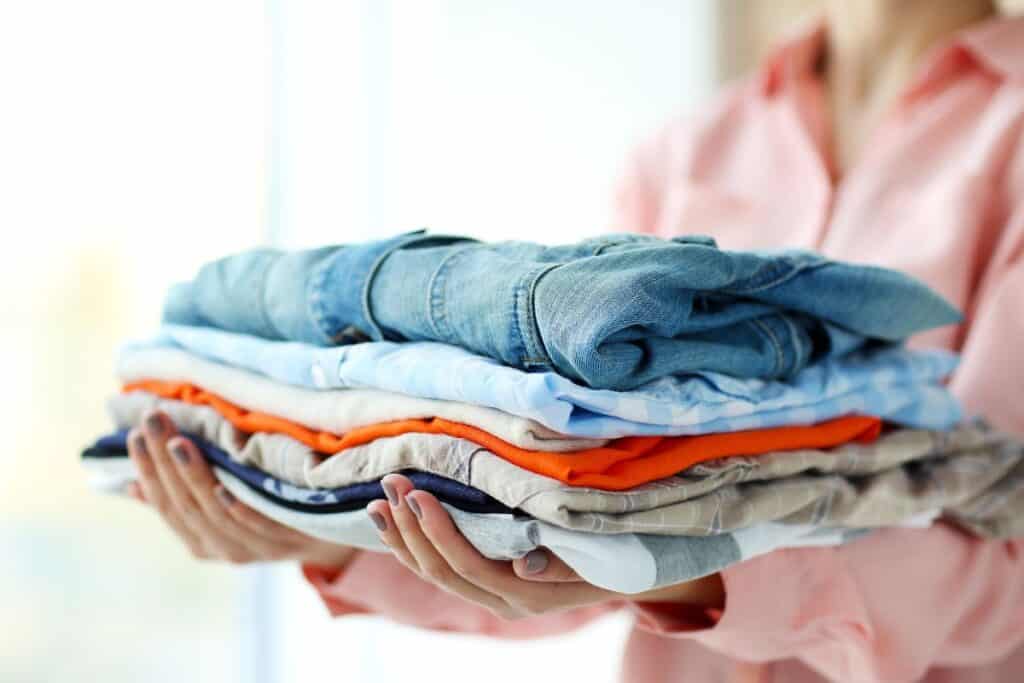
Gentle Formulas that actually work
BEST of all, it just does an amazing job of getting my laundry clean and bright. (Cloth diapers included, which is no small feat).
I also really liked All Free & Clear powder in the past for the cleaning power and lack of fragrance. Although – it’s a little heavier on chemicals and not always available anymore.
Ounce per ounce, Biokleen is usually a better value for us (it uses a tiny scoop and lasts much longer). These are two of the detergents that meet the criteria I look for as far as what meets our family’s needs and actually cleans well.
Of course, you’ll need to experiment and see what works best for you, and your washing machine.
Another one I’m currently experimenting with is Azure Clean Powdered Laundry Detergent. You can find it through the Azure Standard Co-op.
So far, it meets my non-fragrance, “clean” ingredient ideal, and it seems to be working well.
Why Powdered Detergent?
The reason I tend to choose powdered detergents over liquid are probably obvious.
In general, laundry powders:
- Are less expensive per load
- Work better in hard water
- Easier to measure, and less messy
Also: the main ingredient in liquid detergents is water, which makes me think they may be less concentrated than their powdered counterparts.
(Or that I can control the concentration a little more with powder).
However, note: I have a standard top-loading machine with an agitator. For HE machines or the water-saving newer models, you may need to try these brands in their liquid versions. That is – if you notice the powder not dissolving as well as it should.
The One Liquid Detergent I also Love
I have also used Ecos Free and Clear liquid laundry detergent from time to time, with good results overall.
After using it for a few months on my delicate and dark colors, I find that Ecos is very gentle. It also makes my clothes soft without the need for fabric softeners.
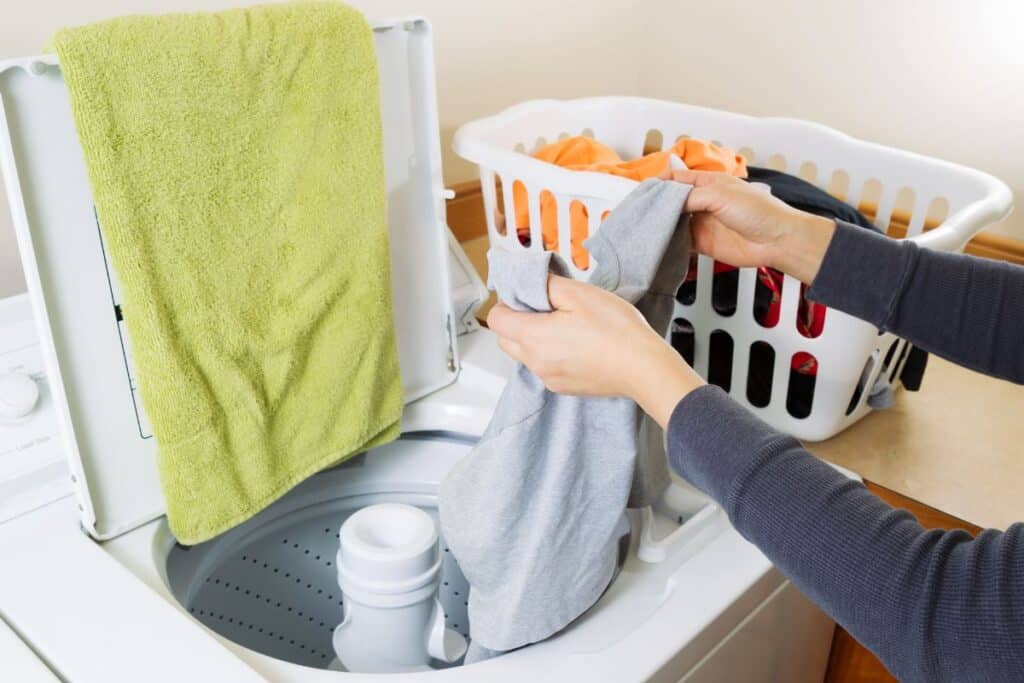
Soft and Fresh Fabrics: Sans Fragrance
I still prefer the two powdered detergents above for my whites, however. They seem to do a better job of deep-cleaning.
If you must have scent
For the die-hard scent fans:
If you really NEED your laundry to smell like something, you can always add a few drops of essential oils to wool dryer balls or a clean washcloth.
Throw it in the dryer (try lemon or orange for starters). This way, you can have your fragrance – without the side effects.
Tip: Wait until your dryer reaches the “cool-down” cycle before adding the essential oils. Otherwise, the heat will disintegrate the scent.
A caution on bleach
One more side note: bleach is another big trigger of headaches for me. I don’t recommend using it in laundry very often.
I clean my washing machine about once a year with bleach, but that’s it for me. There’s a lot of question these days about the safety of using bleach in general, in the home.
Do your research and see what you think. (But that’s another can of worms for another day!)
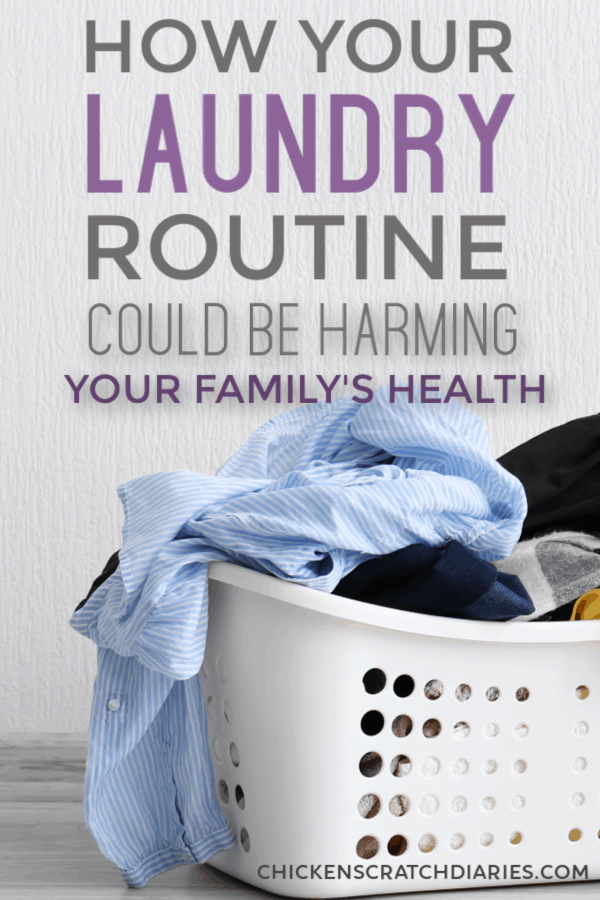
You CAN have Naturally Clean Laundry – without Homemade Laundry Detergent (or concerning chemicals)
Overall, these changes in our laundry routine have definitely benefited our health.
Better yet, it has saved us money by eliminating items we don’t need in order to have clean, fresh laundry.
So although my laundry room may not smell like a fruit salad when I open the dryer, I can live without the side effects.
Of course, it’s a little sad that I won’t be experimenting with homemade laundry “detergent” anytime soon. But maybe in the future there will be other DIY options that work better.
Preferably, options that somehow work as well as detergents with specifically formulated surfactants.
And if my research holds true, our washer and dryer will probably last us several more years going this route. Which is kind of a bummer, because I really had my eye on a shiny new ginormous-capacity set. (Four kids. Enough said.)
You might also like:
Frugal Foaming Hand Soap Recipe
DIY Face Wash for Sensitive Skin
Natural Dishwasher Pods (no plastic)
A Practical Mom’s Guide to a {Naturally} Healthier Home This Year
Creative Money-Saving Hacks for Big Families
How to Keep a Reasonably Clean Home- with Kids
First published 7/27/18; last updated 1/1/24.
Bleach is a trigger for me as well. Interesting read.
Thanks for stopping by, Sheree!
I enjoyed this! Laundry is one of my most detested chores so I haven’t ever given it much thought..haha BUT I didn’t realize all the harm that can come from using a fabric softner!
It really is crazy – liquid fabric softeners also coat the fibers of your towels (and everything really) and make them less absorbent (causing them to repel water).
This was really helpful information! I didn’t know that DIY soap worked that way. I haven’t tried it yet but it was on my list of things to attempt..one thing I can cross off now!!
Glad it was helpful Amanda! I’m sure there’s lots of differing opinions on DIY laundry soap but the research definitely backed up my personal experience with it. Thanks for stopping by!
I love wool dryer balls! I also make a spray with vinegar, water and essential oils to make them smell nice- the vinegar burns off in the dryer heat
The spray bottle mixture is a great idea Shelby! I’ll have to try that too.
What about for machines that require “HE” or high efficiency detergents? These are only liquid products that I can see, so our machine isn’t supposed to be used with powdered detergents…
Hey Shannon! The Biokleen powdered detergent that I mentioned can be used in either HE or regular top loading machines according to the packaging. But definitely go with your manufacturer’s recommendations. I am actually glad you mentioned that because I wanted to update this post to add that I’ve been experimenting with another “greener” detergent over the last month – that happens to be a liquid. I can finally say that I would also recommend it: Ecos Free and Clear. It’s a plant-based formula with fabric softener built in and I am really impressed with how soft my clothes are! No animal fats to cause build-up in the washing machine. No fragrance. I still use my dryer balls as well. I do think the Biokleen made my whites really bright, but for everything else I am really liking the Ecos right now. 🙂
If you run your “Homemade Detergent” through your blender in batches you have a perfectly acceptable homemade detergent without all the crap ingredients in Name brand. It breaks down in hard water and rinses out.
That’s a good idea and if I were to use homemade detergent again, I would definitely recommend blending it. However, I just don’t believe soap works as well as detergent with surfactants. This is why I opted for the “greener” brands that don’t contain all the harmful chemicals but do use surfactants. Even blended up into smaller bits, soap collects on the fibers of clothing and after a few months my laundry is grey-ish and smelly.
I too, made some homemade laundry soap and decided to do the research after the fact, where I learned that it will not lift and/or remove the dirt. So now I add a little bit of my homemade powder and store bought liquid to each load.
I agree with your take on fabric softener and vinegar. Your comments on “detergent” and “surfactants” are not correct, however. Sodium Laureth sulfate is the common ingredient associated with both. It is cheap and it creates suds. Suds are not what cleans your clothes and in fact are not recommended in most (all front loaders) washing machines. I have been using the common three ingredient recipe recipe (washing soda, borax, grated bar laundry soap) for fifteen years, for my family laundry. My husband’s dirty work clothes are a testament that is combination is effective. Because of your comments about this, your case seems more like a sales pitch for the product you mentioned.
Hi Robbi, I understand that you’re saying that both bar soap and detergents contain surfactants – to an extent. From what I understand, there are many different kinds of surfactants, though, some that contain SLS and others that contain derivatives of SLS; and some that don’t contain SLS but ethers of fatty alcohol instead. Most soaps, if I am understanding correctly, work as a surfactant, on different levels though. Zote soap for instance (a common favorite for DIY recipes), is made from tallow (animal fat) and coconut oil, as are many “natural” soaps. So although they may act as a natural surfactant (they trap dirt and lift them away), they just aren’t created to be as effective for laundry machines as commerical detergents– and the animal fats can still be very problematic in washing machines over time, same as with fabric softeners. Other soaps made with chemical surfactants also aren’t formulated the same way as detergents are. Detergents contain surfactants plus other ingredients that work together to lift AND rinse away the dirt and soap better than bar soap can. I think what the original article I linked to explained (better than I can): you just can’t replicate the chemical process at home that is used in commercial detergents. To me, this makes sense as to why the DIY recipes always fell short in my experience.
With that said, Ecos free & clear contains sodium coco sulfate (instead of SLS or SLES) which although there IS still debate about this ingredient, it is supposed to be gentler on skin due to a larger molecular mass. (SLS is derived from petroleum where as sodium coco sulfate is considered plant based as it comes from coconut oil.) Either way, I recommend it along with All Free & Clear because both work well for cleaning our laundry in hard water, and we have not experienced any skin irritation since using them. They also don’t contain fragrances, which is another big deciding factor for us – whereas most bar soaps that are recommended in DIY recipes (including Zote) do contain fragrance.
I am personally not against using SLS based surfactants if it WORKS in your laundry and you’re not noticing irritation. The main point of this article was to discuss the reasons DIY soaps that are used as detergents do not work the same as commercial detergents and might not really save money in the long term, because of the problems bar soaps (fats) can cause in modern washing machines (and on your clothes.)
I use Dropps detergent pods. Everything disappears in the wash. Its a subscription program and has a variety of products. I use the sensitive skin.
I also have the HE restriction and have no problems with these. We have a water softener.
Thanks for the recommendation!
Very interesting article! It’s obvious that you have put a great deal of time in your research. Have you used Bronner’s for laundry? It says to use 1/3 c in wash and add 1/2 c vinegar in the rinse. It is great for so many cleaning needs. Now I’m not sure about it…
I have not tried Dr. Bronner’s but if you try it, let us know! I might experiment with that one too – Dr. Bronner’s is a vegetable-based soap – about as natural as it gets- which contains 5 types of organic oils. I use it in my foaming hand soap that I make. I would assume it does a decent job but I’m not sure how cost effective it would be? I would have to figure up how many loads you can get out of a bottle, since a 32-oz bottle costs about $16 depending where you purchase it.
My homemade laundry detergent uses 1/3 cup Bonners liquid soap and baking soda and washing baking soda and 1 gallon of water. 1/4 cup per load of laundry works great been using for years.
Great read. Have you heard of the EWG website for product safety and toxicity? It’s where I realized I didn’t want to be using Borax for my homemade detergent and went to Pinterest to find something new. Ran across your blog that way. I looked up all the detergents you recommended on the website. The best product by far is the Biokleen. It has a A rating – best you can get. The ECOS was graded a C – ok, but still issues. Yet the All is an F!! I have been reading that anything made by conventional brands like that labeled free and clear actually have chemicals to mask the scents! 🙁 So sad.
I decided to make up a load using Dr. Bronners and the other ingredients I used before of baking soda and washing soda. I am interested in using the Biokleen though.
Definitely let us know your results with Dr. Bronners! I’ve not heard anyone in my area (very hard water) that has had luck with it, but it would be a great natural alternative in my mind. I also feel like Biokleen cleans the best out of all the “green”-friendly detergents I’ve tried, especially for whites. Not surprised on the All detergent – it’s pretty hard to find in powdered form anymore so I haven’t used it lately. I occasionally look at EWG but I take their recommendations with a grain of salt 😉 I read up on how they determine those ratings and sometimes it’s simply lack of information that leads to a poor grade. Also, as time goes on I’m realizing a need for balance. The vast majority of us probably won’t be affected by most of the chemicals in laundry soap, when the laundry is rinsed well. Kind of the same thing with shampoo. For my specific needs, I’m more worried about fragrance- which does tend to linger not only on my clothes but in my house. I am always interested to see what others uncover as they investigate these brands though! (Why does laundry have to be so complicated?) 🙂 Thank you for sharing!
Have you tried “Dropps” laundry detergent? Their packaging is eco-friendly and it’s delivered. What specifically do you look for in a laundry detergent ingredient list? Also, how do you solve the problem hair and fur clinging to clothes? Since i’ve stopped using dryer sheets all my clothes have lots of dog hair, fuzz, and general hair on it. I use wool balls,but it doesn’t help with static (yes, i lowered the drying temp). It’s frustrating because my fiance won’t move away from dryer sheets because of the static/dog hair.
Have not tried Dropps but will look it up! The main thing for me is low-scent or no-scent laundry products as that seems to be a specific problem for our allergen-prone family. We do not have pets but sometimes the hair is a problem (4 girls in the house!) – I will agree! I’ve actually been looking for a good, natural dryer sheet (or mostly natural) that is unscented and doesn’t coat the lint trap. Still searching and sticking to the dryer balls for now; we have some static but it’s not terrible and I have decided I can live with it for now!